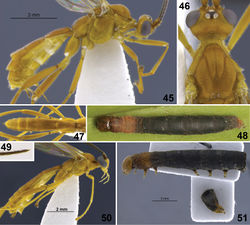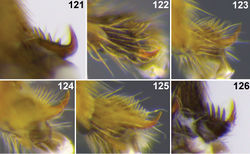Aleiodes falloni
| Notice: | This page is derived from the original publication listed below, whose author(s) should always be credited. Further contributors may edit and improve the content of this page and, consequently, need to be credited as well (see page history). Any assessment of factual correctness requires a careful review of the original article as well as of subsequent contributions.
If you are uncertain whether your planned contribution is correct or not, we suggest that you use the associated discussion page instead of editing the page directly. This page should be cited as follows (rationale):
Citation formats to copy and paste
BibTeX: @article{Shimbori2014ZooKeys405, RIS/ Endnote: TY - JOUR Wikipedia/ Citizendium: <ref name="Shimbori2014ZooKeys405">{{Citation See also the citation download page at the journal. |
Genus: Aleiodes
Name
Aleiodes falloni Shimbori & Shaw, 2014 sp. n. – Wikispecies link – ZooBank link – Pensoft Profile
Description of holotype
Female (holotype). Body length 6.9 mm; antenna length 7.6 mm; fore wing length 6.0 mm.
Color. Body gold–honey brown to orangish brown. Flagellum dark brown, scape and pedicel laterally brown; ocellar triangle black; tarsal claws brown; metasoma ventrally, mandibles, fore and mid coxa light yellowish. Wings weakly infuscate; veins dark brown but C+SC+R honey brown; stigma and vein R1 pale yellow–pale honey brown.
Head. Antenna with 50 antennomeres, flagellomeres roughly 2.0× as long as wide, apical flagellomere with short pointed apex; malar space as long as basal width of mandible, and 0.35× eye height; in dorsal view eye height 2.2× temple; occipital carina incomplete dorsally (but not curved toward vertex), otherwise complete but not touching hypostomal carina; oral space small and circular, maximum width equal to basal width of mandible; clypeus bulging; ocell–ocular distance 0.86× diameter of lateral ocellus; maxillary palp not swollen. Head surface sculpturing finely granulate, higher face with small longitudinal ridge and transverse rugosity directed to it, occiput smooth and shining.
Mesosoma. Sculpturing mostly granulate; pronotum foveate laterally; mesopleuron rugose on anterior corner; propodeum rugose–granulate, posteriorly with diverging and some transverse wrinkles and weakly rugose laterally, with mid-longitudinal carina present on anterior 2/3; notauli present anteriorly, wide and shallow, posteriorly disappears in a depressed area with striations running antero-laterally from mid-posterior region; posterior margin of mesoscutum with short carina, just anterior to scutellar sulcus; scutellar sulcus with median carina plus two pairs of well defined lateral carina.
Wings. Fore wing: stigma 3× longer than high; vein r 0.55× vein 2RS, as long as vein RS+Mb, and 0.5× as long as vein m-cu; vein 3RSa about 0.5 times vein 3RSb, and as long as vein 2M; vein 1CUa 2× vein 1cu-a; vein 1CUb 1.8× vein 1CUa; vein 1M evenly slightly curved. Hind wing: m-cu indicated as short pigmented vein antefurcal to vein r-m (in this species and others, the vein m-cu is very short but is also indicated by a slight bent on vein M, were these veins meet); vein M+CU about 1.4× 1M; vein 1M 1.4× vein r-m; vein RS smoothly curved at middle; vein M straight; vein 2-1A absent.
Legs. Hind tibia without comb of modified setae; tarsal claw pectinate at base, with a distinct gap between apical claw and basal pectination, pectin with 5–6 bristles; hind basitarsus 3× longer than inner apical spur on hind tibia; few rugositie dorso-laterally on outer side of hind coxa.
Metasoma. T1–T2 striated; remainder terga coriaceous; mid longitudinal carina complete from T1 throughout T2; ovipositor sheaths slightly shorter than hind tarsomere II, parallel sided and sharpened apically, setae longer pre-apically, longest setae about 1.5× longer than maximum width of sheaths; T1 slightly longer than apical width.
Variation. Antenna with 49–53 segments; some specimens with weak striation on basal 1/5 of metasomal tergite 3; scutellar sulcus with 3 to 5 well defined carina; one specimen with hind wing vein m-cu interstitial.
Male unknown.
Type material
Type-locality: ECUADOR, Napo Province, Yanayacu Biological Station, Macucoloma trail, S00°35.9', W77°53.4', 2163 m, cloud forest, May 1–8, 2007, J. Simbaña col.
Type-specimen: Holotype female. Top label: “ECUADOR: Napo Province / Yanayacu Biological Station / S00°35.9', W77°53.4’ 2163m / 1-8 May 2007, J. Simbaña / Macucoloma trail, Malaise trap / NSF-BSI-07-17458, S.R. Shaw”; second label: “SRS-00028”. (UWIM)
Paratypes. 1♀, same as holotype; 9♀s, same data as holotype but different dates: 5♀s, May 1–10, 2010; 1♀, June 3–13, 2009; 1♀, April 1–8, 2007; 2♀ February 1–8, 2007. (UWIM)
Discussion
This species belongs to circumscriptus/gastritor species group. It differs from the described species in this group by its mostly honey brown body color. Aleiodes falloni sp. n. resembles Aleiodes speciosus Townsend, from which it can be distinguished by the entire honey brown body color (mostly black–dark brown dorsally with first tergite white in Aleiodes speciosus) and the hind wing vein 2-1A absent (present in Aleiodes speciosus). It is very similar to Aleiodes luteosicarius sp. n., which belongs to the pallidator species-group, especially in color pattern (for distinguishing features see discussion at Aleiodes luteosicarius sp. n. section). Morphological distinction between Aleiodes falloni sp. n. and Aleiodes luteosicarius sp. n. is difficult due to their general resemblance. Separation of specimens in two different entities was supported by comparison of ribosomal COI sequences, resulting in two groups with considerably different genetic information.
Etymology
This species is named after James Thomas Fallon, known as Jimmy Fallon, an American television host, comedian, actor, singer, musician and producer.
Original Description
- Shimbori, E; Shaw, S; 2014: Twenty-four new species of Aleiodes Wesmael from the eastern Andes of Ecuador with associated biological information (Hymenoptera, Braconidae, Rogadinae) ZooKeys, 405: 1-81. doi
Images
|

